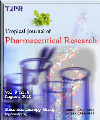
|
Tropical Journal of Pharmaceutical Research
Pharmacotherapy Group, Faculty of Pharmacy, University of Benin, Benin City, Nigeria
ISSN: 1596-5996
EISSN: 1596-5996
Vol. 14, No. 8, 2015, pp. 1357-1364
|
 Bioline Code: pr15178
Bioline Code: pr15178
Full paper language: English
Document type: Research Article
Document available free of charge
|
|
|
Tropical Journal of Pharmaceutical Research, Vol. 14, No. 8, 2015, pp. 1357-1364
| en |
Pinitol Suppresses Tumor Necrosis Factor-α-Induced Invasion of Prostate Cancer LNCaP Cells by Inhibiting Nuclear Factor-κB-Mediated Matrix Metalloproteinase-9 Expression
Jayasooriya, Rajapaksha Gedara Prasad Tharanga; Kang, Chang-Hee; Park, Sang Rul; Choi, Yung-Hyun & Kim, Gi-Young
Abstract
Purpose:
To investigate the mechanism by which pinitol inhibits tumor necrosis factor-α (TNF-α)-
induced expression of matrix metalloproteinase-9 (MMP-9) and invasion of prostate cancer LNCaP
cells.
Methods:
Reverse transcription-polymerase chain reaction (RT-PCR) together with Western blot
analysis was used to analyze the expression of MMP-9 and nuclear factor-κB (NF-κB) subunits, p65
and p50, in TNF-α-treated LNCaP cells, while 3-(4,5-Dimethyl-2-thiazolyl)-2,5-diphenyl-2H-tetrazolium
bromide (MTT) assay, flow cytometry, and DNA fragmentation were used to evaluate cell viability and
apoptosis. MMP-9 activity and invasion were measured by gelatin zymography and matrigel invasion
assay, respectively. DNA-binding activity of NF-κB and AP-1 was determined by electrophoretic mobility
shift assay and luciferase activity.
Results:
MMP-9 activity significantly increased in response to TNF-α; however, pinitol reduced TNF-α-
induced MMP-9 activity without cytotoxicity. Matrigel invasion assay showed that pinitol reduced TNF-α-
induced invasion of prostate cancer LNCaP cells. Further, it downregulated the expression of MMP-9
gene induced by TNF-α-treatment. Pinitol suppressed TNF-α-induced NF-κB activity by suppressing
nuclear translocation of the NF-κB subunits, p65 and p50.
Conclusion:
The results indicate that pinitol is a potential anti-invasive agent and acts by suppressing
TNFα-induced cancer cell invasion and specifically inhibiting NF-κB as well as downstream target
genes such as MMPα9.
Keywords
Pinitol; Matrix metalloproteinase-9; Cell invasion; Nuclear factor-κB; Nuclear translocation
|
| |
© Copyright 2015 - Tropical Journal of Pharmaceutical Research
Alternative site location: http://www.tjpr.org
|
|
